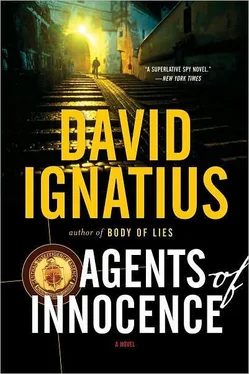David Ignatius - Agents of Innocence
Здесь есть возможность читать онлайн «David Ignatius - Agents of Innocence» весь текст электронной книги совершенно бесплатно (целиком полную версию без сокращений). В некоторых случаях можно слушать аудио, скачать через торрент в формате fb2 и присутствует краткое содержание. Жанр: Шпионский детектив, на английском языке. Описание произведения, (предисловие) а так же отзывы посетителей доступны на портале библиотеки ЛибКат.
- Название:Agents of Innocence
- Автор:
- Жанр:
- Год:неизвестен
- ISBN:нет данных
- Рейтинг книги:3 / 5. Голосов: 1
-
Избранное:Добавить в избранное
- Отзывы:
-
Ваша оценка:
- 60
- 1
- 2
- 3
- 4
- 5
Agents of Innocence: краткое содержание, описание и аннотация
Предлагаем к чтению аннотацию, описание, краткое содержание или предисловие (зависит от того, что написал сам автор книги «Agents of Innocence»). Если вы не нашли необходимую информацию о книге — напишите в комментариях, мы постараемся отыскать её.
Agents of Innocence — читать онлайн бесплатно полную книгу (весь текст) целиком
Ниже представлен текст книги, разбитый по страницам. Система сохранения места последней прочитанной страницы, позволяет с удобством читать онлайн бесплатно книгу «Agents of Innocence», без необходимости каждый раз заново искать на чём Вы остановились. Поставьте закладку, и сможете в любой момент перейти на страницу, на которой закончили чтение.
Интервал:
Закладка:
“I count on the snobbery of the secret police,” said Jamal. “They would never imagine that anyone dressed like this would be worth following.”
“I hope you’re right,” said Rogers, walking toward the window.
The drapes were closed to prevent surveillance from across the street, leaving the room nearly dark at midday. Rogers opened the drapes slightly. The street looked quiet. In the building across the way he saw women and children. In one apartment, a young man was sitting alone reading a newspaper and looking idly out the window. He looked harmless. Rogers closed the drapes.
He offered Jamal a whisky. The Palestinian smiled and said no, tea would be fine. They made small talk for only a few minutes. Jamal seemed eager to do business. From the folds of his dusty gallabiya, he removed two sheets of paper covered with dense Arabic writing and handed them to Rogers with a flourish. The shyness of Kuwait had vanished.
“The Old Man sends greetings to the United States,” Jamal said.
Rogers touched his heart in a sign of gratitude.
“What’s in the papers?” Rogers asked.
“Part of our security cooperation,” said Jamal, still beaming.
“Tell me,” said Rogers. The tape recorder was going. He wanted a record for Stone.
“We are giving you the names of eight people who are attending a training camp in South Lebanon. There are four Palestinians, two Germans, and two Italians. They are studying techniques that could be used in airplane hijackings. The Popular Front for the Liberation of Palestine organized the camp, but one of the trainers works for us.”
“Why are you giving us this information?” asked Rogers.
“The Old Man doesn’t like the fact that the Europeans are involved,” explained Jamal.
It struck Rogers as an odd sort of racism, the notion that it was all right for Palestinians to blow airplanes out of the sky but not Europeans. But he kept his mouth shut.
“The second page is the most useful,” said Jamal with the knowing smile that a lawyer or accountant might use in briefing a client.
The second page gave details about the passports that had been prepared for the eight by the PFLP’s documentation bureau. The four Palestinians would be travelling on real Algerian passports, the two Germans and two Italians on false ones from their home countries. The names and passport numbers were listed neatly.
“Thank you,” said Rogers.
Rogers was more pleased than he wanted to admit. The document was a bonanza. It would allow Western intelligence services to track the terrorists as they left the training camp in Lebanon, monitor their contacts with other operatives in Europe and the Middle East, and apprehend them before they killed anybody.
The American dreaded what he had to do next.
“The names and passport numbers are fine, as far as they go,” Rogers said in a measured voice.
“But they don’t tell us all that we need to know. They tell us who will try to hijack airplanes and discredit the Palestinian Revolution. But they don’t tell us when or where. For that, we must go further. I am sorry to push you, Jamal, but we must move to a new level of security cooperation.”
Jamal looked at him suspiciously. The enthusiasm had drained from his face. His lips were tight and his nostrils flared.
Rogers removed the paperweight from his pocket.
“This is a simple device that can help us save many lives. I’ll explain how it works…”
“Aaacchh!” Jamal cut him off with a sharp cry. It was almost a scream, a noise that someone might make to block out another sound he didn’t want to hear.
“Impossible! It is absolutely impossible! I told you in Kuwait that I will not be your spy!”
Jamal was almost shouting. Rogers was torn between concern for the Palestinian and worry about the racket he was making.
“Shhh!” said Rogers.
He walked to the darkened window again and pulled the curtain back a hair to see if the noise had roused anyone. After no more than a second he let it fall back in place.
Rogers groaned and bit his lip. He turned to Jamal and spoke in an eerily calm voice.
“My friend,” said Rogers. “Your problems are just beginning.”
In an apartment across the way, Rogers had seen the same man he had glimpsed before. Still in the same spot, still pretending to read a newspaper. It was so obvious. Why hadn’t Rogers realized it before? The man across the street was a watcher, and he was watching the safehouse. Somehow, despite all the precautions, the Egyptian Moukhabarat had them under surveillance.
Rogers took a deep breath and exhaled slowly. He turned to Jamal.
“There is an escape plan,” Rogers said coolly. The apartment had been provisioned with this sort of contingency in mind. He led Jamal to a bedroom and pointed to the simple business suit and broad-brimmed hat that were in the closet.
“Put them on as quickly as you can,” said Rogers.
The Palestinian wordlessly obeyed.
“There are sunglasses in the pocket of the jacket,” Rogers said. “Put them on.”
Rogers looked at his feet and saw that he was still wearing the peasant sandals. There were no shoes in the closet. Never mind. It would have to do. Rogers led the Palestinian toward the front door.
“Listen to me carefully and do exactly as I say. If you follow these instructions precisely, there is no reason that anyone should identify you as having been here.
“Take the stairs down two flights to the basement. At the bottom of the stairwell is a door. Open it. The door leads to a tunnel that passes underground to the basement of the next building. When you come out of the tunnel, walk calmly up the stairs to the front door. It opens on a busy street where the Heliopolis streetcar line makes a stop. The stop is thirty yards from the building. Wait in the doorway until you actually see the streetcar coming. Then walk out quickly and catch it.
“When you get downtown, take a bus from Tahrir Square toward Giza. Stop at one of the clubs along the Pyramids Road where the whores work all day long. Go in and stay with one of the girls as long as you can. Give her a big tip so she’ll remember you. There should be some money in the jacket.
“When you get back to Beirut, Fuad will make contact with you. In the meantime I’ll try to find out what happened here.
“Any questions?”
Jamal looked at Rogers as if for the first time. He shook his head silently. In his eyes was a look of professional respect and deference, the look of a junior officer obeying his superior. Rogers opened the door quickly and peered down the corridor. There was nobody.
“Move!” he said, and Jamal was gone.
Rogers waited fifteen minutes and repeated the same escape procedure himself. Except that he didn’t go to the whorehouse on the Pyramids Road for his alibi. He went to the U.S. Embassy.
Four days later, the Cairo station managed to debrief its best agent within the Egyptian Moukhabarat about the incident in Heliopolis. The damage was less than Rogers had feared. It was the apartment that had been under surveillance, not Rogers or Jamal. Because of a lapse on the part of the Cairo station, the “safehouse” wasn’t so safe.
The Moukhabarat had photos of everyone who had gone into the building. They had made a tentative identification of Rogers, who the Egyptians remembered from the old days in South Yemen. But they were having more trouble with the other person who had been dressed in simple Arab garb and shielded his face. The pictures of him were fuzzy.
The Egyptians had tentatively concluded that Rogers had been meeting with a member of the “Ikhwan Muslimin,” the Moslem Brotherhood that bitterly opposed the Nasser regime. A half-dozen members of the the Ikhwan had been arrested in the last twenty-four hours in Cairo and Alexandria. They were being tortured for information about the group’s contacts with the CIA. Several had died protesting their innocence.
Читать дальшеИнтервал:
Закладка:
Похожие книги на «Agents of Innocence»
Представляем Вашему вниманию похожие книги на «Agents of Innocence» списком для выбора. Мы отобрали схожую по названию и смыслу литературу в надежде предоставить читателям больше вариантов отыскать новые, интересные, ещё непрочитанные произведения.
Обсуждение, отзывы о книге «Agents of Innocence» и просто собственные мнения читателей. Оставьте ваши комментарии, напишите, что Вы думаете о произведении, его смысле или главных героях. Укажите что конкретно понравилось, а что нет, и почему Вы так считаете.












